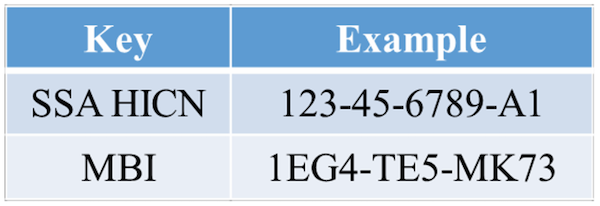CMS transition to new Medicare Beneficiary Identifier is complete
As AHCP first reported nearly two years ago, the Centers for Medicare and Medicaid Services has been working to replace everyone’s Medicare card and assign them a new Medicare number, known as a Medicare Beneficiary Identifier (MBI). As of January 1, 2020, that process is complete and CMS will no longer process claims that are submitted with the old number.
Why are they doing this?
As Experian explains, “The shift to MBIs is an effort to protect patient information and address the vulnerabilities that come with relying on Social Security Numbers (SSN) to verify patient identities.”
CMS elaborates on this goal, which is “To decrease Medicare Beneficiary vulnerability to identity theft by removing the SSN-based HICN from their Medicare identification cards and replacing the HICN with a new Medicare Beneficiary Identifier (MBI).”
Randomly generated number
The new MBI is a randomly generated, 11-character, “non-intelligent” unique identifier. Non-intelligent means that the number is not based on a beneficiary’s SSN or anything else that can be linked to the beneficiary. The MBI is a mixture of letters and numbers, but the key positions 2, 5, 8, and 9 will always be letters; characters 1, 4, 7, 10, and 11 will always be numbers; and the 3rd and 6th characters may be either a letter or a number.
Here’s an example provided by CMS of the old HICNs and new MBIs:

Transition is now complete
Again, all Medicare beneficiaries should now have a new card, and after a transition period in which either the old or new numbers were accepted, CMS will only accept claims that include the new Medicare Beneficiary Identifier going forward. If you have clients who still have their old Medicare cards, you may want to advise them to either throw them away or at least put them away to avoid any problem with claims payment.
More information
In the grand scheme of things, this not a very significant adjustment. But some people struggle with or are confused by change, so it might be a good idea to send a quick communication to your Medicare clients and offer to answer any questions they may have.
For more information about the transition to MBI’s, here’s a recently updated document from the Medicare Learning Network.

